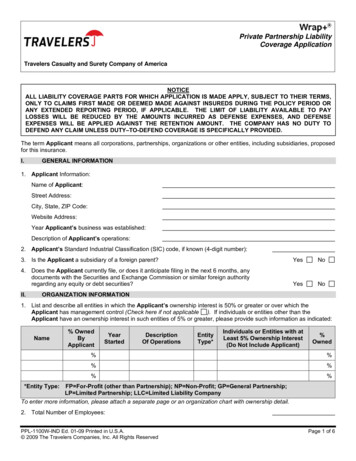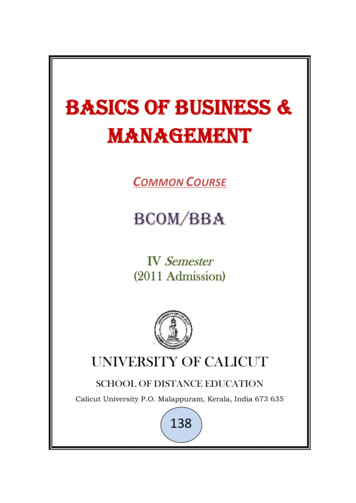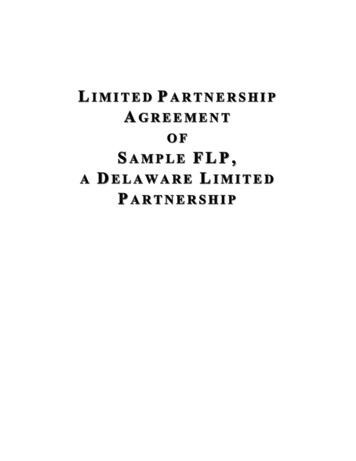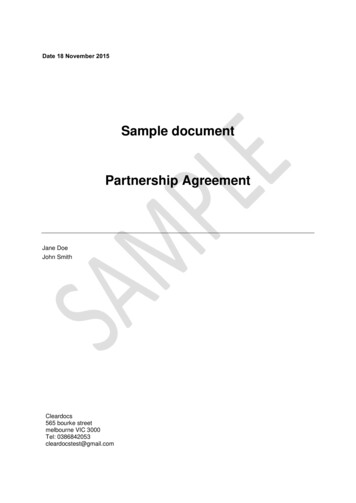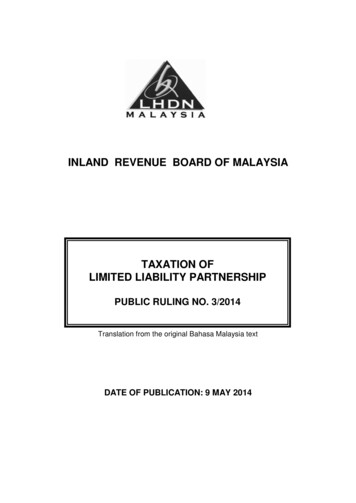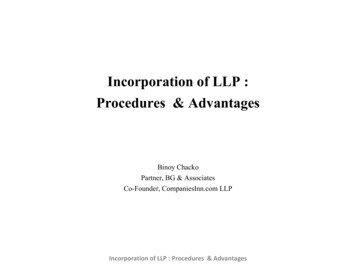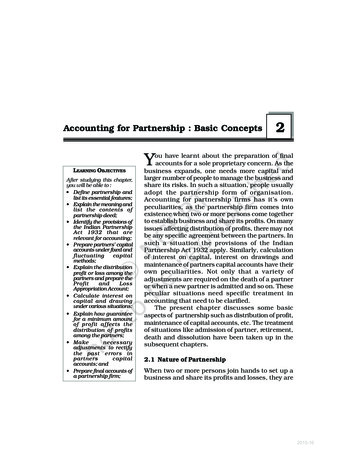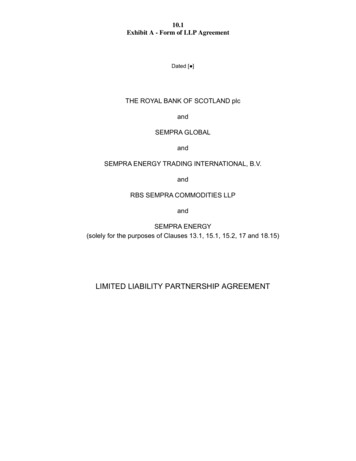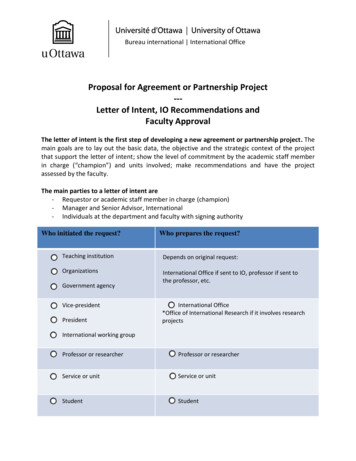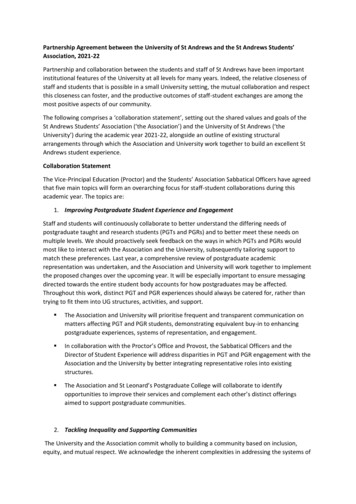
Transcription
Partnership Agreement between the University of St Andrews and the St Andrews Students’Association, 2021-22Partnership and collaboration between the students and staff of St Andrews have been importantinstitutional features of the University at all levels for many years. Indeed, the relative closeness ofstaff and students that is possible in a small University setting, the mutual collaboration and respectthis closeness can foster, and the productive outcomes of staff-student exchanges are among themost positive aspects of our community.The following comprises a ‘collaboration statement’, setting out the shared values and goals of theSt Andrews Students’ Association (‘the Association’) and the University of St Andrews (‘theUniversity’) during the academic year 2021-22, alongside an outline of existing structuralarrangements through which the Association and University work together to build an excellent StAndrews student experience.Collaboration StatementThe Vice-Principal Education (Proctor) and the Students’ Association Sabbatical Officers have agreedthat five main topics will form an overarching focus for staff-student collaborations during thisacademic year. The topics are:1. Improving Postgraduate Student Experience and EngagementStaff and students will continuously collaborate to better understand the differing needs ofpostgraduate taught and research students (PGTs and PGRs) and to better meet these needs onmultiple levels. We should proactively seek feedback on the ways in which PGTs and PGRs wouldmost like to interact with the Association and the University, subsequently tailoring support tomatch these preferences. Last year, a comprehensive review of postgraduate academicrepresentation was undertaken, and the Association and University will work together to implementthe proposed changes over the upcoming year. It will be especially important to ensure messagingdirected towards the entire student body accounts for how postgraduates may be affected.Throughout this work, distinct PGT and PGR experiences should always be catered for, rather thantrying to fit them into UG structures, activities, and support.The Association and University will prioritise frequent and transparent communication onmatters affecting PGT and PGR students, demonstrating equivalent buy-in to enhancingpostgraduate experiences, systems of representation, and engagement.In collaboration with the Proctor’s Office and Provost, the Sabbatical Officers and theDirector of Student Experience will address disparities in PGT and PGR engagement with theAssociation and the University by better integrating representative roles into existingstructures.The Association and St Leonard’s Postgraduate College will collaborate to identifyopportunities to improve their services and complement each other’s distinct offeringsaimed to support postgraduate communities.2. Tackling Inequality and Supporting CommunitiesThe University and the Association commit wholly to building a community based on inclusion,equity, and mutual respect. We acknowledge the inherent complexities in addressing the systems of
oppression and inequality that continue to affect our community and will work together to create apositive, safe, and welcoming student experience for all. This will include continuous improvementand advertisement of Report and Support, equality and diversity modules and training, and Securityand Response, among others. We aim to tackle inequality in all its forms and work alongsidestudent-led groups such as the BAME Students Network, Disabled Students’ Network, Lifers, andSaints LGBT to build and engage with their peer communities. Additionally, we recognise theimportance of extending new forms of support to international student communities, especially nowthat EU students are included in this cohort, and aim to seek out feedback through ongoinginteractions with international students. Affordability and accessibility are paramount to building awelcoming and inclusive St Andrews environment for all communities of people. The Association,Student Services, Development Office, RBS, and others will work together to join up theircommunications and increase engagement with support resources available.In collaboration with the VP Governance, VP People and Diversity (if in post), the Director ofStudent Experience, and key EDI staff members, the Sabbatical Officers will work to evaluateand achieve ‘Diverse St Andrews’ through the Student Equality Forum, the EqualOpportunities Committee, and our student representatives’ participation in variousUniversity committees.In collaboration with the VP Education and Director of Student Experience, the SabbaticalOfficers will help to carry forward workflows related to diversifying the curriculum to includemore recognition of the ways in which privilege affects learning and teaching.The University and Association resolve not only to recognise, but to address continuedinstances of discrimination and violence in the community. The continued negative effectsinstances of sexual and gender-based violence (SGBV) as well as hate-motivated instancesof violence impose upon St Andrews must be acted upon swiftly, through survivor-centeredapproaches.3. Strengthening Student Development and Co-curricular ActivitiesA central component of delivering an excellent student experience is the provision of opportunitiesfor students to engage in co-curricular and development activities. The development of professionalskills, personal skills, and other qualities represents a critical priority for both the University and theAssociation, equipping students with the tools they need to succeed during and after theirstudies. The Association and University strive to provide different communities of students withtangible skills they can take away from their St Andrews experience, especially through ensuringbodies such as the Careers Centre or CEED are student-facing and easily accessible. The SA Directorof Student Development and Activities, the SA Director of Education, the AU President, the SADirector of Student Experience, and the VP Education will seek to ensure development events aretailored to diverse experiences, needs, and preferences.The Association and University will provide outlets for students to explore entrepreneurialcreativity, ensuring simultaneously that these opportunities are financially accessible. Workrelated to ‘Entrepreneurial St Andrews’ must be visible to students in order for them to getinvolved in activities that will allow for the development of entrepreneurial skills.The Association seeks to collaborate even more closely with the Careers Centre, building acollaborative approach to the aims set out in the Association Employability Strategy and the
Careers Centre Strategic Plan. To do this, the Association’s physical spaces should beintegrated into the Careers Centre’s vision and a channel through which students can givedirect input into initiatives before they are rolled out should be provided.The Association and University agree to explore investing in an updated and userfriendly Volunteering Portal. This would facilitate a simple process through which studentscan track their hours while increasing employability and recognition. The GraduateAttributes could be incorporated into the Volunteering Portal and developed to allowstudents to more accurately reflect on their engagement.4. Advancing Environmental SustainabilityThe University and the Association acknowledge the immense urgency associated with addressingthe global climate crisis and realise the responsibilities institutions hold in building a sustainableworld for current and future generations of students. The challenges in this area are extensive, asthey span multiple levels of governance and stretch across timescales. Therefore, we must engage inshort- and long-term planning together to account for the complexity of advancing environmentalsustainability in St Andrews at the speed and scale required. Planning for a more sustainable StAndrews and indeed for a more sustainable world requires a substantial rethinking of the ways inwhich we operate collectively and an appreciation for who is protected or harmed in processes ofenvironmental and social change. The Association and University will endeavor to applyintersectional understandings of the effects of privilege and discrimination on our progress towardssocial, economic, and environmental sustainability. The Environmental Sustainability Board (ESB)represents a key forum in which staff from the University and students from the Association cancome together to bring forward key objectives and involve students with diverse lived experiences incontributing to sustainability policies.Staff and students should collaborate to build cohesion among the goals, messaging, andsustainability policies of the University and Association. The Association is currentlyreviewing its strategic plan, and as part of this process, aims to bring their sustainabilitypolicy into alignment with the University’s commitments and seek out opportunities formore collaborative arrangements and communications. This will require advice and supportfrom the Principal’s Office in order to ensure the Association’s policy and practiceAll aspects of student life in St Andrews should be considered when planning for the‘Sustainable St Andrews’ strategic pillar, whether this be the affordability ofsustainable transport, food, or other areas. The Association and University will worktogether to signpost available resources and make a broader subset of the student bodyaware of ongoing initiatives.Students and staff can engage with Sustainability in the Curriculum group and otherbodies to build greater understanding and capabilities to advance environmentalsustainability.5. Living with Covid and BeyondOur collective experience of the Covid-19 pandemic has forever changed the ways in which we learnand live. The University and Association aim to change the narrative to foster a productive approach
to the present and future effects of the pandemic, defined by our collective attempts to live withCovid and mitigate its effects on our experiences. The overarching aim is to integrate lessons fromthis time period into a ‘new normal’ and build more resilience while protecting and improving thestudent experience. We aim to better understand the disparity in experiences and effects of Covid19 on different students, whether it be unequal access to resources such as good Internetconnections or study spaces or distinct experiences of social interaction and government support. Tothis end, we will better advertise and promote support services and coordinate our communicationswhen regulations change.The University and Association acknowledge how heavily learning and teaching have beenaffected since the start of the pandemic and resolve to maintain the positive changes thathave been developed and simultaneously address negative experiences related to digitalfatigue or missing out on key learning experiences. This year, academic representatives seekto understand where students feel ‘behind’ and how they feel positive changes from onlinelearning should be carried into the future.In relation to the new strategic focus of ‘Digital St Andrews’, the Association aims to supportthe University in maximising on the opportunities arising from expanding our digital offering,while maintaining the sense of community and interpersonal relationships unique to the StAndrews experience.The University and Association will collaborate to provide a wide range of activities, spaces,and services to address the isolation we have been forced to endure throughout thepandemic. The various levels of risk different students are willing to take must beconsidered, alongside improving mental health resources for those who require increasedsupport.Partnership ArrangementsSabbatical OfficersThe Students’ Association is run by a student-majority Board and five Sabbatical Officers,who are directly elected by the student body.oEach Officer provides leadership in a specific area of student life at the University:the Director of Wellbeing oversees student welfare, equalities, and democracy;the Director of Education is responsible for matters related to education, academicrepresentation, and postgraduate studies;the Director of Student Development and Activities supports affiliated student groups andstudent activities including volunteering and employability;the Director of Events and Services co-ordinates the major events of the year and overseesregular commercial operations;the Association President is responsible for the outward-facing side of the Association’sactivities, including image and strategic planning as well as sustainability, accommodation,and affordability concerns.
oThe Athletic Union President is directly elected by the student body to represent themacross all sporting platforms, including overseeing all club and recreational sport at theUniversity. They sit on the Athletic Union Board and liaise closely with the Director of Sportto contribute to strategy and governance.Membership of Committees, Working Groups, and Business Change InitiativesSabbatical officers and other elected student representatives give voice to student interestson a wide range of University committees, including the most strategic and senior ones suchas Court, Academic Senate, and their committees. Three students are membersof University Court and six students sit on Academic Senate.In turn, the Students’ Association Board and Athletic Union Board include a senior memberof University staff nominated by the Principal’s Office.Relevant student representatives frequently sit on University working groups and projectboards.Staff from Student Services and the Students' Association collaborate topromote positive student wellbeing through their joint Stand Together Project and throughawareness campaigns delivered by the Students' Representative Council's (SRC) WellbeingSubcommittee. The Director of Wellbeing represents students on the University’s MentalHealth Task Force and acts as the student lead on the Student Mental Health Agreement – aseries of joint initiatives and targets to support student mental health and wellbeing.Other services, such as the University Library, the University’s Museums and theSustainability division of Estates, have identified students who attend meetings, discusspolicy, and advise on future projects.The Association President sits on the Community Council and attends the Town Group,alongside the Community Engagement and Environmental Responsibility Officer from thePrincipal’s Office.Academic RepresentationThe University and the Students’ Association jointly deliver training to School Presidents andClass Representatives. Staff inclusion allows student-led projects to have more consistency,and to be informed by the institution’s history.There are two seats reserved for students at the Learning and Teaching Committee andPostgraduate Research Committee, both subcommittees of Academic Senate: these areusually occupied by the Students’ Association Director of Education (DoEd) and PostgraduateAcademic Convenor.Two students (usually the DoEd and Postgraduate Academic Convenor) are full members ofthe University’s Academic Monitoring Group; and students are regularly invited to bemembers of LTC and PGRC Working Groups as well as having a key role in University-ledReviews of Learning and Teaching.Students are represented on the Student Experience Committee, the Enhancement ThemesGroup and can bid for funding from that group and the Teaching Development Fund andPostgraduate Research Fund.
The DoEd and Postgraduate Academic Convenor are supported by a further network ofstudent representatives in the academic Schools. Each School has an elected SchoolPresident, who represents its Undergraduate student cohort. The School President leads agroup of Class Representatives and chairs their School’s Student-Staff ConsultativeCommittee. The Postgraduate Academic Convenor coordinates a system of postgraduaterepresentatives, who are led by a newly established PGT President and PGR President.The School Presidents and PG Presidents liaise closely with the Director of Teaching in theirSchool, as well as with the DoEd and Postgraduate Academic Convenor, who set their centralagenda and organise regular meetings of all Presidents.The DoEd also arranges the bi-semestrial School Presidents’ Forum, chaired by the Rectorand attended by the Proctor and Deans, for discussion and clarification of academic policyand processes.School Presidents also attend academic monitoring dialogues along with their Head ofSchool and Director of Teaching.The Students' Association Teaching Awards recognise teachers and support staff whocontribute significantly to students' learning and teaching experience.Module Evaluation Questionnaires allow students to provide direct feedback on variousaspects of their modules.DemocracyThe University Rector is directly elected by the student body and appoints a Rector’sAssessor to be a representative within the student body.The Senior Lay Member of the University Court is elected by students and staff.Members of the Students’ Association Students’ Representative Council often workwith Senior University staff on policy-making and other initiatives.Where possible and where confidentiality and time scales allow, student opinion is canvasedmore widely on significant strategic decisions such as major new capital projects andchanges to the academic calendar.Other Collaborative ArrangementsThe University frequently appoints student interns to provide a student-centred focus. Theyare encouraged to contribute in these roles.Student focus groups are frequently consulted over specific projects (for example, regardingthe new academic year or the taught postgraduate experience).The activities of student-led academic societies are often attended by lecturers andprofessors. Academic Schools often work collaboratively with these societies to host orfinancially contribute to their activities.AuthorLeonie Malin Höher, Students’ Association Director of Education
ContributorsAnna-Ruth Cockerham, Students’ Association Director of WellbeingAvery Kitchens, Students’ Association Director of Student Development and ActivitiesJess Smith, Athletic Union PresidentLottie Doherty, President of the Students’ AssociationClare Peddie, Vice Principal Education (Proctor)
St Andrews Students' Association ('the Association') and the University of St Andrews ('the University') during the academic year 2021-22, alongside an outline of existing structural arrangements through which the Association and University work together to build an excellent St Andrews student experience. Collaboration Statement


